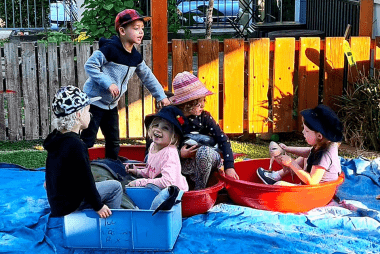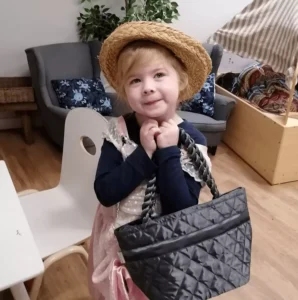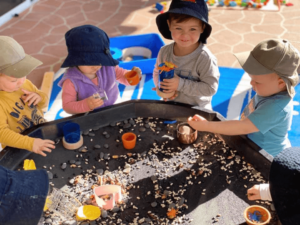
Photo: Busy Bees on Maroochy
“Every child is born blessed with a vivid imagination” – Walt Disney
There’s nothing quite like the magic of a child’s imagination. Where a walk on the beach turns into a hunt for Pirate treasure, a bed becomes a sailboat surrounded by hungry sharks in the ocean, a stack of pillows transforms into a King’s fort, and stuffed toys turn into patients in a doctor’s office.
While some may consider these moments just “play time”, studies have shown that imaginative and sociodramatic play has a significant role in a child’s development, enhancing children’s social, emotional and cognitive skills as well as their identity.
According to the Early Years Learning Framework p17, ACECQA, “Play provides opportunities for children to learn, as they discover, create, improvise and imagine.”
Therefore, imaginative play is a vital component of a child’s development, contributing to their creativity, problem-solving skills, and social skills, while also learning about the world around them. In this article, we will explore the benefits of imaginative play, provide imaginative play ideas for young children, and discuss how to create an imaginative play space that fosters creativity and learning.

Photo: Busy Bees at Bellmere
What is Imaginative Play?
Imaginative play, also known as pretend play or role play, is a form of play that involves using one’s imagination to create a make-believe world. Children engage in imaginative play to express their thoughts, feelings, and experiences and to learn about the world around them.
Imaginative Play – What History Says
A growing body of research shows that children who engage in imaginative play are more likely to be future creative thinkers. Many studies have found that children who showed more imagination and emotion in their play are, in general, better divergent thinkers, which is associated with higher creative thinking abilities.
The importance of imagination and creativity has long been encouraged throughout history by the likes of Walt Disney, Albert Einstein and Leonardo da Vinci, just to name a few. Celebrated Russian Psychologist, Lev Vygotsky recognised imaginative play as a “leading factor in development” and believed imagination created action.
Lev Vygotsky said, “A child’s greatest achievements are possible in play, achievements that tomorrow will become her basic level of real action.” His work and findings on imagination and creativity have influenced Early Childhood Education both in Australia and Internationally.
Early Learning Consultant, Alastair Bryce-Clegg offers his ideas on ‘deconstructed role play‘ which is also encouraged at Busy Bees and relies on a child’s own experiences to foster play in a space where materials can be anything—the possibilities are endless and are unique to each child.
This highlights the profound impact imaginative play has on a child’s growth and learning. But how can parents and educators nurture this creativity in everyday play?
The Australian Early Years Learning Framework is a key component of the National Quality Framework for Early Childhood Education and Care. It offers a vision where “all children experience learning that is engaging and builds success for life” and recognises the importance of imagination and creativity to help children become confident and involved learners.
Let’s explore some engaging and simple imaginative play ideas for young children.
Benefits of Childhood Imaginative Play
Imaginative play has numerous benefits for young children.
1. Enhances Creativity & Problem-Solving Skills
-
- Encourages children to think outside the box and come up with new ideas.
- Helps them explore different solutions in pretend scenarios.
2. Supports Cognitive Development
-
- Improves memory, attention span, and critical thinking.
- Strengthens understanding of cause and effect.
3. Develops Language & Communication Skills
-
- Expands vocabulary as children act out different roles and situations.
- Encourages storytelling, sentence formation, and expressive communication.
4. Boosts Social & Emotional Growth
-
- Helps children understand and express emotions.
- Encourages empathy by pretending to be different characters.
- Builds confidence through role-playing.
- Helps children understand and express emotions.
5. Strengthens Motor Skills & Coordination
-
- Fine motor skills improve through activities like dressing dolls or using playdough.
- Gross motor skills develop through running, jumping, and pretending to be animals or superheroes.
- Fine motor skills improve through activities like dressing dolls or using playdough.
6. Encourages Independence & Decision-Making
-
- Allows children to take charge of their own play.
- Helps them practice making choices and solving problems.
- Allows children to take charge of their own play.
7. Promotes Cooperation & Teamwork
-
- Teaches children how to share, take turns, and work together in pretend play.
-
Helps them navigate social interactions.
- Teaches children how to share, take turns, and work together in pretend play.
8. Builds Confidence & Self-Expression
-
- Gives children a safe space to try new things.
- Helps them practice leadership and assertiveness in play scenarios.
- Gives children a safe space to try new things.
9. Reduces Stress & Anxiety
-
- Provides an outlet for emotions and imagination.
- Allows children to process real-life experiences in a fun, low-pressure way.
10. Fosters a Love for Learning
-
- Encourages curiosity and discovery.
- Helps develop a positive attitude toward exploration and problem-solving.
- Encourages curiosity and discovery.
Imaginative Play Ideas for Young Children
Imaginative play can take many forms. Children may become different characters, transform materials into new objects or find themselves in a new world creating their own stories. Whether they are pretending to be a soldier, a chef, or a teacher, children love to immerse themselves in these roles, which helps them understand different life perspectives and the world around them.
Here are some imaginative play ideas for young children:
- Playing dress-up: Using props and costumes to create characters and scenarios can be a delightful way for children to explore different roles and identities.
- Toy kitchen or restaurant: Engaging in imaginative play with food and cooking can help children learn about nutrition, cooperation, and even basic math skills.
- Building a fort or playhouse: Creating a special space for imaginative play can provide a safe and exciting environment for children to let their creativity run wild.
- Role play with pretend play dolls or stuffed animals: Creating scenarios and storylines with their favourite toys can help children develop their storytelling and social skills.
- Pretend play store or shop: Engaging in imaginative play with money and commerce can teach children about financial literacy and the value of goods and services.
With technology, devices and screenplay taking up more time in our current world, sometimes it can be difficult to get children to enjoy the basics of “play”. The Raising Children Network recognises the importance of imaginative play and provides a list of additional indoor and outdoor play ideas for Families and Caregivers to help encourage imagination in children.

At Busy Bees Australia, we value every child’s unique interests and ideas and our Educators encourage children to draw on their curiosity, creativity, intuition and imagination to help them improvise in a way that suits the time, place and context of their learning. Doing so provides an opportunity for children to explore, solve problems, create and instruct in a safe environment.
